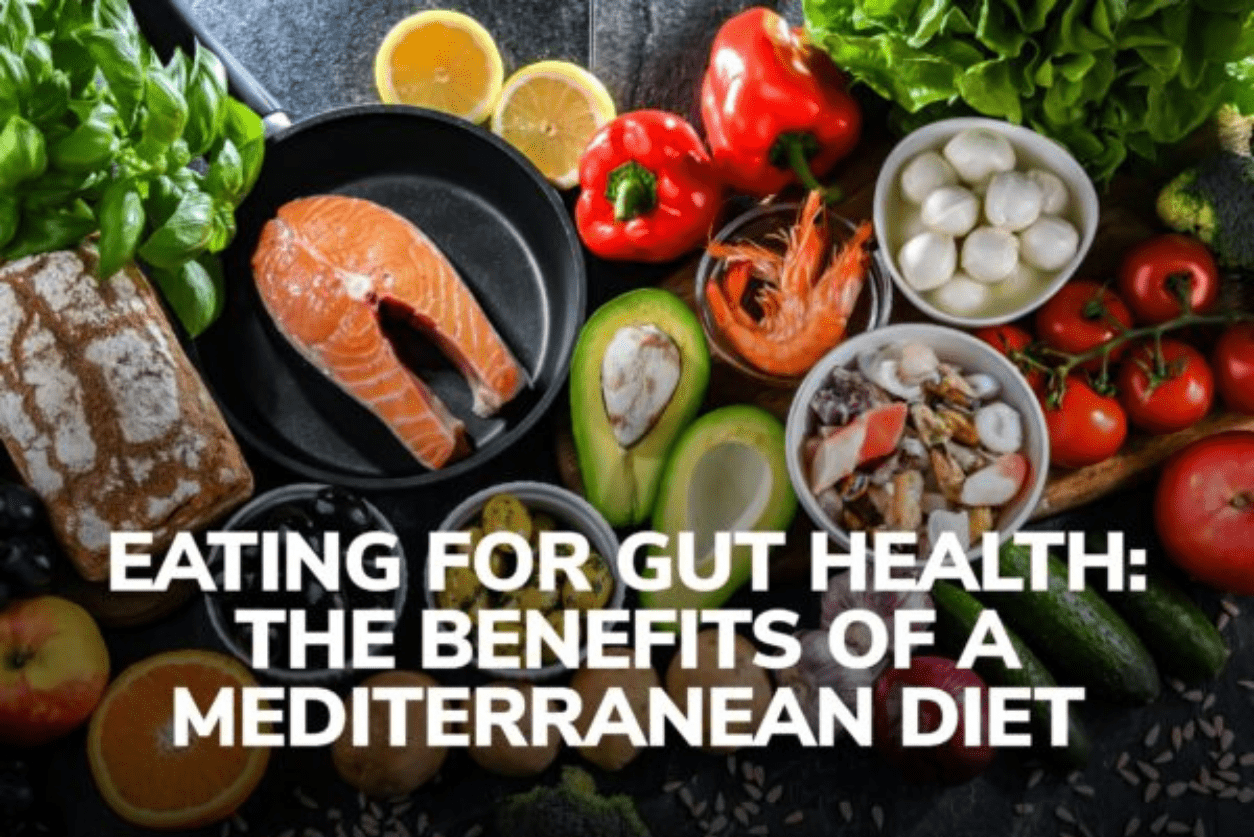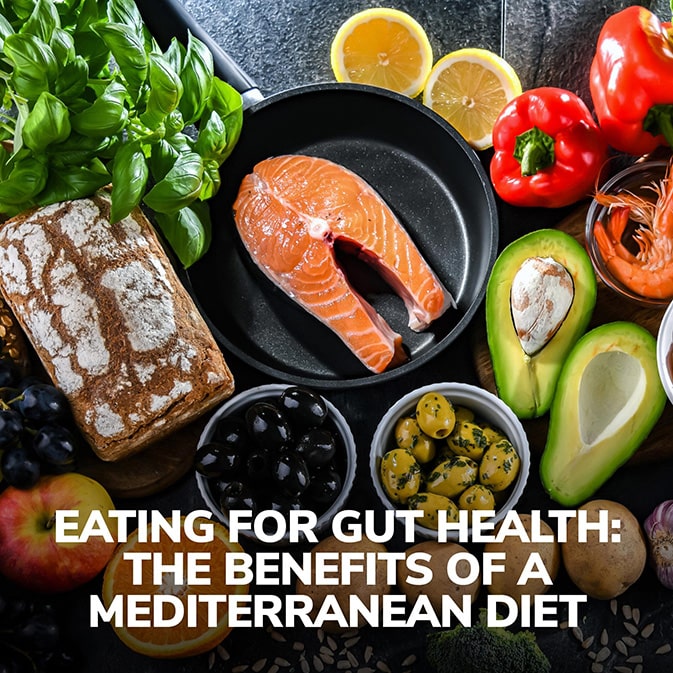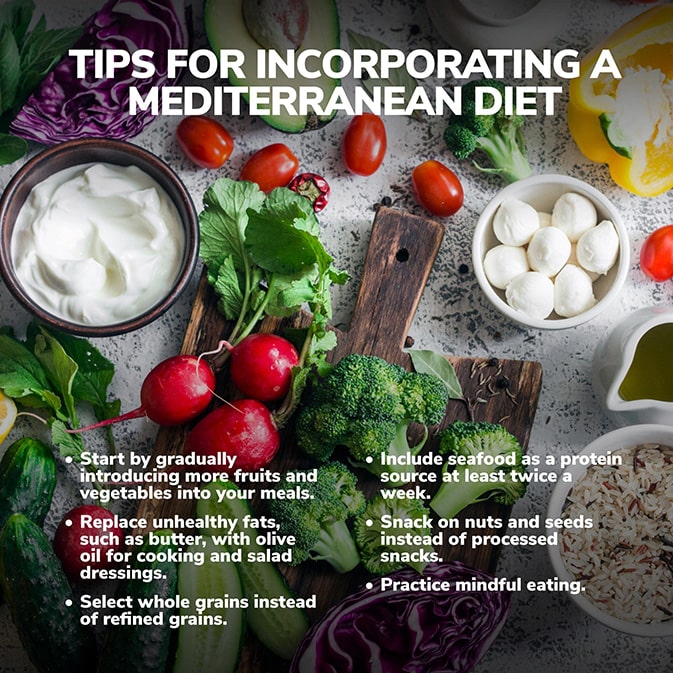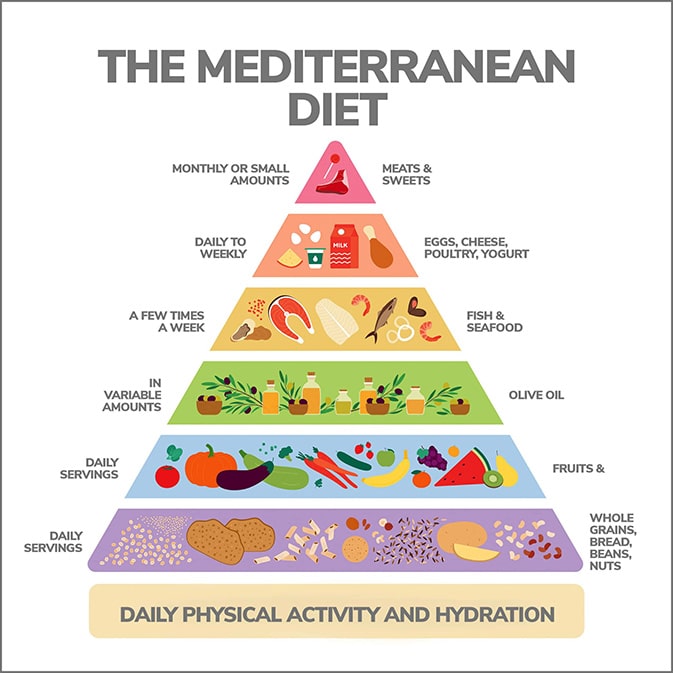
Eating for Gut Health: The Benefits of a Mediterranean Diet
Understanding Gut Health and Its Impact on Overall Wellness
Trillions of microorganisms inhabit the human gut and are vital to our overall health and well-being. Gut health is the balance of these microorganisms and the proper functioning of the digestive system. A healthy gut is crucial for digestion, immune function, mental health, and disease prevention.
Research has shown that a compromised gut can lead to various health issues such as bloating, constipation, diarrhea, and even chronic diseases like obesity and diabetes. Maintaining a healthy gut is essential for optimal wellness! One way to achieve this is through a balanced and nutritious diet, such as the Mediterranean diet.

The Mediterranean Diet: A Brief Overview
The Mediterranean diet is more than a dietary regimen; it is a lifestyle many people embrace to balance their gut and maintain health. It is characterized by lots of fresh fruits and vegetables, whole grains, legumes, nuts, and seeds. Olive oil is the primary source of fat. Fish, poultry, and dairy are consumed in moderation, with limited consumption of red meat and processed foods.
The Link Between the Mediterranean Diet and Gut Health
Many studies have investigated the link between the Mediterranean diet and gastrointestinal well-being, and the results are promising. The diet’s emphasis on plant-based foods and fiber-rich ingredients nourishes beneficial gut bacteria, promoting a diverse and balanced microbiome. (Your body is home to about 100 trillion bacteria and other microbes, collectively known as your microbiome.) The Mediterranean diet’s moderate consumption of fish and olive oil provides essential fatty acids known for their anti-inflammatory properties that contribute to gut health.
The Mediterranean diet limits the consumption of processed foods and red meat, while lowering sugar intake. These restrictions help maintain a healthy gut by reducing inflammation and supporting the growth of beneficial bacteria. This can result in enhanced digestion, improved nutrient absorption, and a reinforced immune system.
A study published in the European Journal of Nutrition found that individuals following a Mediterranean diet had more beneficial gut bacteria, such as Bifidobacterium and Lactobacillus, than those on a Western diet. These bacteria are recognized for their anti-inflammatory properties and role in promoting gut health. Another study published in the journal Gut revealed that adhering to a Mediterranean diet was associated with a lower risk of developing inflammatory bowel diseases, such as Crohn’s disease and ulcerative colitis. The diet’s anti-inflammatory nature and high fiber content were believed to be the contributing factors.
Key Components of the Mediterranean Diet
The Mediterranean diet is rich in critical foods that contribute to digestive wellness. Fruits and vegetables provide a wide range of vitamins, minerals, and antioxidants, which support overall gut health. These plant foods are also high in fiber, promoting regular bowel movements and helping prevent constipation.
Whole grains, such as whole wheat bread and brown rice, are another essential component of the Mediterranean diet. They are a great source of dietary fiber, which acts as a prebiotic, fueling the growth of beneficial gut bacteria, and promoting a healthy gut environment and improved digestion.
Tips for Incorporating a Mediterranean Diet
Embracing the Mediterranean diet can be both rewarding and enjoyable.
Here are a few tips to get started:
- Start by gradually introducing more fruits and vegetables into your meals. Aim for a variety of colors to ensure a diverse range of nutrients.
- Replace unhealthy fats, such as butter, with olive oil for cooking and salad dressings.
- Select whole grains instead of refined grains. Opt for whole wheat bread, brown rice, and whole grain pasta.
- Include seafood as a protein source at least twice a week. Fresh fish, such as salmon or sardines, are excellent choices due to their rich omega-3 fatty acids.
- Snack on nuts and seeds instead of processed snacks. Almonds, walnuts, and flaxseeds are excellent options, packed with healthy fats, fiber, and essential nutrients.
- Practice mindful eating. Savor your meals and be fully present and engaged when eating.

Other Dietary Factors to Consider for Optimal Gut Health
While the Mediterranean diet is an excellent choice for promoting gut health, other dietary factors should be considered. First, stay hydrated by drinking adequate water throughout the day. Water helps maintain proper digestion and assists in the prevention of constipation. Second, probiotic-rich foods, such as yogurt, kefir, and sauerkraut, can also be beneficial for gut health. These foods contain live bacteria that can help restore the balance of gut microorganisms.
Lastly, pay attention to food intolerances or sensitivities affecting your gut health. Common culprits include gluten, dairy, and certain FODMAPs (fermentable oligosaccharides, disaccharides, monosaccharides, and polyols). If you suspect any food intolerances, it is best to consult with your gastroenterologist dietitian.

Lifestyle Habits That Support a Healthy Gut
Besides a healthy diet, certain lifestyle habits can also contribute to a healthy gut. Regular exercise has been shown to enhance gut motility and promote a diverse gut microbiome. Aim for at least 150 minutes of moderate-intensity exercise a week, such as brisk walking or cycling.
Stress management is another crucial aspect of gut health. Chronic stress can negatively impact digestion and disrupt the balance of gut bacteria. Find relaxation techniques that work for you, such as meditation, yoga, or deep breathing exercises.
Adequate sleep is also essential for a healthy gut. Lack of sleep has been linked to an imbalance in gut bacteria and increased susceptibility to digestive issues. Aim for 7-9 hours of quality sleep each night.
Our Favorite Recipes
Ready to transform your diet? Here are some of our top Mediterranean dishes and recipes for gut health you can try!
- Dinners that support gut health.
- Recipes to promote brain and gut health.
- One-pot dinners to help reduce inflammation.
- BEST Mediterranean Diet Recipes.
Contact Us
Embrace the Mediterranean diet and transform your gut health with Gastroenterology of Greater Orlando. The Mediterranean diet’s focus on plant-based foods, healthy fats, and moderate protein intake creates an optimal environment for a balanced and diverse gut microbiome. Embark on the path to a healthier gut by integrating Mediterranean-inspired options into your routine and experience the transformative benefits of enhanced digestion and overall well-being.